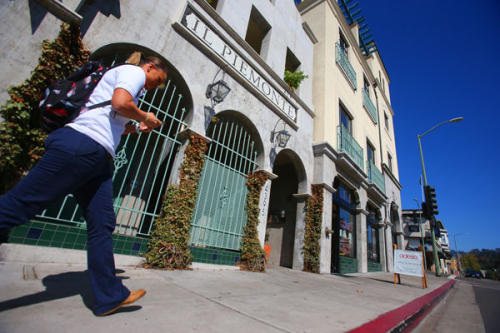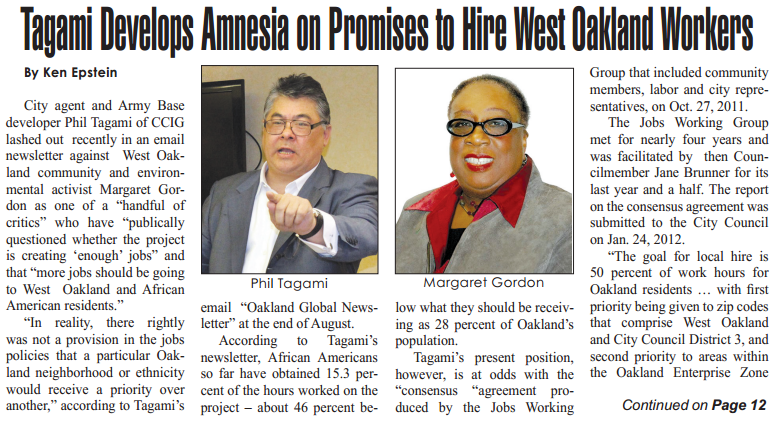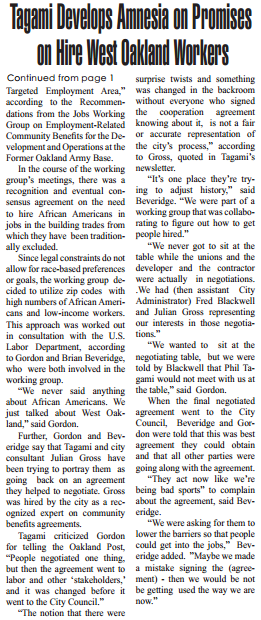|
IN THE SUNDAY OCTOBER 19 2014 ISSUE OF THE BAY AREA NEWS GROUP (OAKLAND TRIBUNE) ARTICLE by Investigative Reporters Thomas Peele and Josh Richman "MISERLY IN IMAGE A MOGUL IN REALITY" EXPOSES GOVERNOR JERRY BROWNS REAL ESTATE FORTUNE IN THE CITY OF OAKLAND WITH PHIL TAGAMI AND OTHERS. GENE HAZZARD WHO CURRENTLY HAS A LAWSUIT ON APPEAL AGAINST PROLOGIS CCIG OAKLAND GLOBAL LLC [aka PHIL TAGAMI ] AND THE CITY OF OAKLAND ON THE DEVELOPMENT ON THE FORMER OAKLAND ARMY BASE WHICH TAGAMI NOT ONLY CONTROLS 85% OF THE REAL ESTATE DEVELOPMENT PROJECT BUT HE IS AN AGENT FOR THE CITY ON THE PROJECT AS WELL , AN APPARENT CONFLICT. ADDITIONALLY, HAZZARD HAS RAISED ISSUES OF THE REAL ESTATE TRANSACTIONS INVOLVING BOTH THE ROTUNDA BUILDING AND THE ROTUNDA GARAGE BEFORE MEMBERS OF THE OAKLAND CITY COUNCIL WHO REFUSE TO TAKE ANY ACTION TO PUT TAGAMI IN DEFAULT. IN 2011/2012 , HAZZARD CONVINCED THE CITY TO DO AN AUDIT OF THE FOX THEATRE THAT REVEALED THAT THE PROJECT WENT 172% OVER BUDGET WITH 526 CHANGE ORDERS COSTING IN EXCESS OF $12 MILLION DOLLARS WHICH TAGAMI WAS PAID ON EACH CHANGE ORDER. THE OAKLAND TRIBUNE STATES " Brown has quietly built a small fortune in real estate..., in part by going into business with prominent Oakland developers whom he once regulated as the city's Mayor. "This newspaper found that Brown has stakes in millions of dollars of East Bay real estate with developers Phil Tagami - who did a lot of business with Oakland when Brown was mayor- and John Protopappas, who was Brown's landlord". "But Tagami's history with the governor is well documented". "THE DEVELOPER'S TIES DATE BACK AT LEAST TO 1998-MONTHS BEFORE BROWN'S MAYORAL ELECTION -WHEN HE UNDERTOOK REDEVELOPMENT OF THE HISTORIC ROTUNDA BUILDING WITH $12 MILLION IN LONG-TERM LOANS FROM THE CITY. BROWN AND HIS WIFE ANNE GUST HELD THEIR 2005 WEDDING IN THE RESTORED BUILDING. Tagami, who was one of Mayor Brown's biggest boosters, was chosen in 2004 as project manager for the crown jewel of Brown's mayoral tenure: redevelopment of the decades - dormant Fox Theater in the City's Uptown District. The theater's restoration ballooned from an original estimate of $33 million to a final price tag of $99 million with Tagami's company benefiting greatly from the project's increased cost according to a 2011 city audit". http://www.mercurynews.com/nation-world/ci_26755131/jerry-browns-investments-belie-monastic-image 4395 Piedmont Ave. in Oakland, a building in which Jerry Brown has a stake. (Aric Crabb/Bay Area News Group) Jerry Brown's investments belie monastic image By Thomas Peele and Josh Richman Staff writers © Copyright 2014, Bay Area News Group POSTED: 10/19/2014 06:37:18 AM PDT 11 COMMENTS| UPDATED: ABOUT 23 HOURS AGO Throughout his political career, Jerry Brown has cultivated an almost monastic image, famously sleeping on a mattress on the floor during his first go-round as governor and flying for peanuts on Southwest during his current term. But in recent years Brown has quietly built a small fortune in real estate and stock holdings, in part by going into business with prominent Oakland developers whom he once regulated as that city's mayor, a Bay Area News Group analysis of Brown's personal investments shows. While Gov. Brown was busy over the last four years frugally balancing California's budget, the state's chief executive was actively building up his multimillion-dollar real estate portfolio. Just two years ago, he invested in an $11 million office building near Oakland International Airport in an area that is being considered for a massive "Coliseum City" redevelopment project that could include new baseball and football stadiums. And earlier this year Brown and partners broke ground on a 100-unit apartment building on prime real estate they bought in 2007 on the Oakland-Emeryville border. This newspaper found Brown has stakes in millions of dollars of East Bay real estate with developers Phil Tagami -- who did a lot of business with Oakland when Brown was mayor -- and John Protopappas, who was Brown's landlord. He also drew up to $100,000 in income last year from a Beverly Hills investment firm, is part-owner of his family's sprawling Colusa County ranch and owns up to $1 million worth of stock in a medical office software firm, while his wife owns more than $1 million in Jack in the Box stock. Yet the actual size of Brown's fortune, the identities of most of his partners and the nature of their business dealings remain a mystery. That's because California hasn't significantly updated its financial disclosure laws for elected officials in decades, and the forms that officials must fill out require only the vaguest information. So details of Brown's investments remain sketchy and his penny-pinching persona remains intact as he seeks an unprecedented fourth term and refuses to release any financial information about himself beyond what is legally required. That doesn't sit well with Californians fighting for transparency in financial disclosure laws. "It's one thing to follow the letter of the law, but the public does have a right to know who a governor's partners are," said Sarah Swanbeck of California Common Cause, a public interest group. And not just any governor -- but one who won his first term in 1974 while also championing the Political Reform Act, which sets the state's disclosure rules. Brown "should be setting an example about disclosure for the rest of the state," said Peter Scheer, executive director of the San Rafael-based First Amendment Coalition. In all, Brown and his wife, former Gap executive Anne Gust Brown, last year disclosed real estate, business and stock holdings worth from $2.53 million and $6.2 million. That range is so wide because the form requires that an investment's or property's value be reported only in broad categories -- such as $10,001 to $100,000, $100,001 to $1 million, or more than $1 million. And that latter figure has not changed in at least 20 years, according to the state Fair Political Practices Commission. Elected officials also need not disclose exactly what their businesses do or who their partners are. For example, the business of Beverly Hills-based Round Two Investment Partners, from which Brown received from $10,001 to $100,000 in income in 2013, is described only as "investment in a variety of interests." Brown's campaign spokesman, Dan Newman, said the governor won't provide any details beyond what's on the forms. And political experts say discussing the details of his wealth isn't in Brown's interest. "Jerry Brown has obviously attended the Warren Buffett school of public relations," said Dan Schnur, a former GOP strategist who now directs the University of Southern California's Unruh Institute of Politics. "He's certainly not anywhere near as wealthy as Buffett, but they both understand the benefits of talking about their personal frugality as a way of connecting with people who don't share their financial means." The same can be said for Brown's Republican challenger, Neel Kashkari, 41, an asset manager and former Treasury Department official who has made fighting poverty a major platform plank and even spent a week in Fresno pretending to be jobless and homeless. He's hardly either. His divorce papers show he used to make $500,000 a month as an asset manager, which explains how he was able to put $2.1 million of his own money into his campaign this year. And Kashkari, who rents a seaside house valued at $8 million in affluent Laguna Beach, also still owns a Truckee home with his ex-wife worth an estimated $1.4 million. But you would know none of that from his official disclosure form, which requires candidates to list neither their net worth nor the value of their homes. The 76-year-old Brown, however, has been a public figure longer than Kashkari has been alive, making the haziness of his business dealings that much more frustrating to transparency advocates. Governors, Scheer said, should all release their tax returns as a matter of course to show their most accurate possible net worth. In June 2010, Brown had agreed to the Bay Area News Group's request to release his tax returns if his Republican opponent, billionaire Meg Whitman, released hers. But the Whitman campaign balked, arguing that Brown should release returns for all 27 years since his first two terms as governor. When asked by editorial writers in July of that year if the returns would indicate he had "cashed in" since his first two terms as governor, Brown said "no." This year, Brown has refused all requests to release his tax returns. Kashkari has said he'll release tax returns for as many years as Brown does. Brown's stake in the Oakland office building, owned by the Tagami-led Edgewater Park Plaza LLC, is worth from $100,001 to $1 million. He received from $1,001 to $10,000 in income from it last year. The building's tenants include the Girl Scouts of Northern California, a flight school, a limousine company, several luxury car dealers, health care companies and law offices. Asked for an interview, Tagami requested a list of questions by email and then didn't respond to them. Newman, Brown's campaign spokesman, later told this newspaper that Tagami won't answer questions about his current business dealings with Brown. But Tagami's history with the governor is well-documented. The developer's Oakland City Hall ties date back at least to 1998 -- months before Brown's mayoral election -- when he undertook redevelopment of the historic Rotunda Building with $12 million in long-term loans from the city. Brown and Gust held their 2005 wedding in the restored building. Tagami, who was one of Mayor Brown's biggest boosters, was chosen in 2004 as project manager for the crown jewel of Brown's mayoral tenure: redevelopment of the decades-dormant Fox Theater in the city's Uptown District. The theater's restoration ballooned from an original estimate of $33 million to a final price tag of $91 million, with Tagami's company benefiting greatly from the project's increased cost, according to a 2011 city audit. As mayor, Brown appointed Tagami to the Port of Oakland Board of Commissioners in 2000 and, as governor, to the California Lottery Commission in 2012 and the California Medical Board in 2013. Tagami isn't the only big Oakland developer Brown now does business with. The governor is also part of a holding company that owns a $6.4 million apartment building in Oakland's Uptown District, an area where he championed development as the city's mayor; the 100-unit apartment building under construction on the Oakland-Emeryville border; a $14 million warehouse in San Pablo; and a $3 million office complex in San Ramon. That company's principal, Protopappas, is Brown's former landlord and campaign treasurer. Protopappas told this newspaper that "40 to 50" others are involved in the company, Madison Park Holdings LLC. He declined to name any of them, but said the company's real estate ventures are aimed at providing tax shelters and long-term capital gains. "He's the governor and he's a friend and he's an investor," Protopappas said of his relationship with Brown, adding that he does no business with the state, so there are no conflicts of interest. "I don't need anything from the governor." Protopappas already had made a name for himself converting old industrial buildings into lofts by the time he and Brown became friends shortly after Brown's 1992 presidential bid. In 1993, Brown bought a lot on Harrison Street near Jack London Square and tore down the warehouse that stood there. Protopappas developed the 17,500-square-foot live-work space that became Brown's home, office and intellectual salon for the following decade. Later, Protopappas redeveloped the old Sears building at 27th Street and Telegraph Avenue into a condo complex around 2000. Gust and Brown lived there from 2003 until 2007, when they moved to a $1.8 million Oakland hills home. And Protopappas has served as chief financial officer and director of the Governor's Residence Foundation, a nonprofit that raises money from undisclosed donors to pay the $3,000 monthly rent on the luxury loft in which Brown and Gust live when in Sacramento. The governor even takes in a few thousand dollars a year from his family's 2,500-acre cattle ranch in Colusa County, although records from the California Secretary of State's Office show the corporation that runs it -- in which Brown is a director -- has been suspended from doing business for not keeping its filings up to date. Newman said the person who was handling the ranch's business -- the governor's younger cousin, Helen Brown of San Rafael -- died in December 2011, "so the paperwork wasn't being received and handled, but it's being fixed now." Robert Stern, former general counsel to the state Fair Political Practices Commission, said Brown can be a valuable asset to his partners -- whoever they are -- just by virtue of who he is. "His name is worth something," perhaps making it easier to attract other investors, Stern said. "The question is whether he gets access to things that ordinary people, like me, would not." Staff writer Howard Mintz and Michael Reicher of the Los Angeles Daily News contributed to this report. Follow Thomas Peele at Twitter.com/Thomas_Peele, and Josh Richman atTwitter.com/Josh_Richman. Read the Political Blotter at IBAbuzz.com/politics. Jerry Brown's investments belie monastic image
0 Comments
|
Gene HazzardDon't Be Envious of Evil Men Archives
June 2024
Categories
All
|
- Home
- Sanjiv Handa
- Gene's Blog
- Rotunda RFP
- Gene Hazzard -Keeping eyes open
- Chronology of Tagami's scheme of Private-Public Partnership with City Projects
- Another Tagami scheme - Rotunda Building deal
- Oakland Army Base
- Billboards in Oakland
- Port of Oakland
- Oakland Raiders?
-
Who is running Oakland?
- Jerry Brown
- Don Perata
- Judge Robert B. Freedman
- Jacques Barzaghi
- Gawfco Enterprises
- Deception
- Doug Bloch
-
Phil Tagami
>
- SF Business Times November 20, 2005
- Rotunda wrestling
- A conversation with Oakland developer Phil Tagami
- Audit of $91 million Fox Theater project
- Tagami Conflict
- CCIG Response to Oakland Works
- Oakland developer Phil Tagami named to state medical board
- ‘Shotgun Phil’ hits another bullseye — with governor’s help
- CleanOakland Store
- CenterPoint Properties







 RSS Feed
RSS Feed
